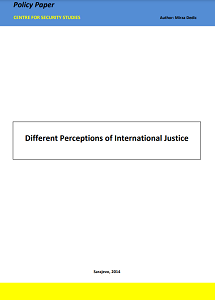Different Perceptions of International Justice
Different Perceptions of International Justice
Author(s): Mirza Dedić
Subject(s): Criminal Law, International relations/trade, Studies in violence and power, Wars in Jugoslavia
Published by: Centar za Sigurnosne Studije
Keywords: international justice; law; perceptions; BiH; war; ICTY;
Summary/Abstract: The war in Bosnia and Herzegovina following the dissolution of the former Yugoslavia in the early 1990s is rightfully regarded as one of the bloodiest conflicts since the World War II. As such, this war impacted individuals, society, as well as the relations among different groups to a large extent (Kostic 2012:664). Looking retrospectively at the conflict, one might conclude that this impact had to be expected, mostly due to the enormous diversity (i.e. ethnic, cultural) among the people, which created huge cleavages that could not be overcome at the time. The fact that the war ended with the externally imposed peace is a good indicator of these cleavages – this negotiated compromise meant that there were no victors and no losers in the war (Williams and Scharf 2002:160-1). Following the end of the Cold War, Samuel P. Huntington was largely praised and credited for invoking the ‘clash of civilizations’ thesis. Looking at the Balkans, it is noticeable that ethnic patchwork and historical divisions among different groups burden the region itself, which is even more exacerbated with the differing political tradition and levels of economic development (Simonovic 1999:440). Whether the region itself can be considered as the best case study of the living ‘clash of civilizations’ thesis is debatable, but it is clear that the cleavages among the groups were an enormous exacerbating factor in the conflict itself.
Series: Centar za Sigurnosne Studije - POLICY PAPER
- Page Count: 22
- Publication Year: 2014
- Language: English
- Content File-PDF
- Introduction

